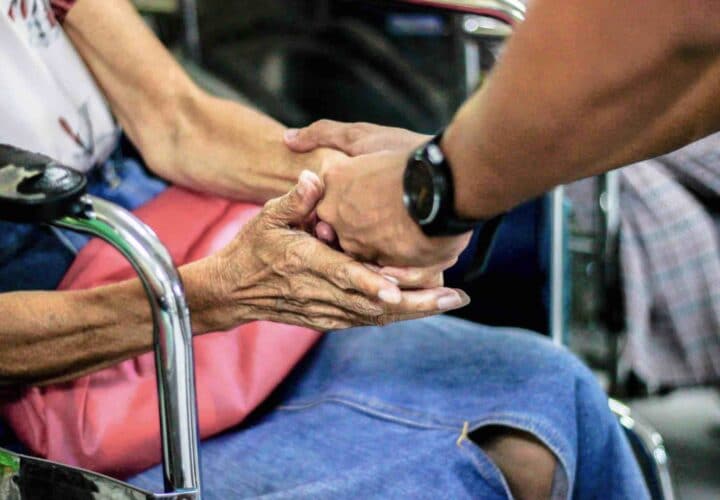How can you remove some of the stress around caregiving and build a supportive caregiving "dream team?" Dementia caregiving expert Teepa Snow lays out an action plan.
Caregiving often falls to family members and loved ones. In fact, in the U.S., only about a quarter of dementia caregivers are from outside a person’s circle of family and close friends. Just because a family member might be the most likely choice to act as caregiver, it doesn’t mean they have the experience or know-how to feel prepared to step into the role. When it comes to Alzheimer’s and other forms of dementia, studies show caregivers often feel ill-equipped to take care of their loved one, especially in the later stages of the disease.
But, according to dementia caregiving expert Teepa Snow, there are some steps caregivers can follow to make sure they’re giving themselves the quality care as they’re giving their friend or family member. When readers had the chance to ask Snow anything in a recent Q&A, questions ranged from how to know when it’s time to move your loved one into memory care, to how to cope with caregiver burnout and guilt, to what a caregiving “dream team” looks like.
The expectations that fall on caregivers are often extreme, Snow said. “You want to be the best mom and you want to be the best wife,” she noted. “It turns out, you’re human. It’s so disappointing to be humans instead of goddesses that get it all done.”
Reader question: How do you know when it’s time to move your loved one to memory care?
In the later stages of the disease, caring for your loved one at home can become very challenging due to the safety concerns and stress that comes with it. Snow shares that the conversation with your loved one about moving into a long-term care facility should happen early, if it is an option financially.
“By the time we’re seriously considering asking this question,” Snow said. “The answer is truly, it would have been better for both of us to have thought about doing this three months ago, because I would have been in a better place to be thoughtful about where and what the options are.”
Many caregivers feel a sense of guilt for moving a loved one into long-term care, but Snow encourages them to reframe it. “They [the person receiving care] would have been in a better place with me not being so distressed, that it feels like I’m trying to get rid of them versus we’re trying something different because we seem to be struggling here.”
Dementia Q&A: Making Tough Decisions About Hospice, Palliative Care
Reader question: How do I cope? How do I manage all the job roles that have become mine? How do I deal with feeling guilty because it’s just not good enough?
The responsibilities of a caregiver are seemingly endless. Many caregivers take on the legal and financial responsibilities of managing their loved one’s estate, as well as any physical and mental health care responsibilities that they experience with dementia.
Delegating tasks to others who may be more skilled or have more knowledge in an area like legal expertise or financial management can relieve some of the stress. “It’s time to stop being the only person, because one human being cannot be everything to another human being 24/7. It’s just not possible. By setting yourself up to fail, you’ll fail.” Snow said.
Recognizing when you need help as a caregiver and subsequently asking for help can be a form of self-care. Knowing your own limits as a caregiver and prioritizing your needs will help both you and your loved one. “And so recognizing I can’t do all this stuff, and I shouldn’t, because there’ll be nothing left of me to support this person I care about because I’m using me all up, and I’m not getting a refill,” Snow offered as guidance to caregivers.
Reader question: Is there such a thing as a caregiving “dream team?” What kind of caregiving team should most people really have in place?
Caregivers might face severe stress, sleep deprivation, and “caregiver guilt.” And, research found, family caregivers are more than twice as likely to develop depression, and almost twice as likely to develop cognitive impairment themselves. All this can lead to burnout and isolation, according to Snow. For this reason, they say caregiving takes a village, and assembling that caregiving “dream team” is a critical step in caring for your loved one — and caring for yourself in the process.
Snow says a caregiving team should have at least one person who can act as support for your loved one, and another person who can act as support for the caregiver. “There should be at least two other human beings—one that I’m depending on. I may actually need a group of people around me, because I need multiple people to bounce things off of. For each person, and each situation, there’s going to be something special for you,” Snow said.
The assistance you need a caregiving team for can change on a given day depending on the circumstances. “For others of us, they may need just one person to go to and to talk with, who is not going to give me advice, but instead is going to listen to me and help me think through things, talk things through, and explore things,” Snow said. Ideally, there’s a spare in your caregiving dream team. If one of the core people in your caregiving team isn’t available on a given day, having a spare can ensure you still have another person who can help.
Being honest with yourself when recognizing what you are good at and what areas you might need more support in can help you assemble your “dream team.” Try to source people that can fit into your team in the areas most needed. Caregiving is challenging and can test the limits of anyone, but asking for help can alleviate many caregiving stressors.
A Step-By-Step Guide to Assembling a Dementia Caregiving Team
Watch the rest of this hour-long conversation on our YouTube.




